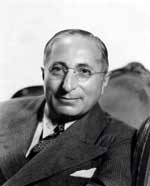

| Barney Balaban | Louis B. Mayer |
| James F. Byrnes | Dore Schary |
| Harry Cohn | "General" Nicholas Schenck |
| William Goetz | Mendel Silberberg |
| Samuel Goldwyn | Spyros Skouras |
| Eric Johnston | "Major" Albert Warner |

For four consecutive years Louis B. Mayer was the highest-paid man in America, a reward he firmly believed sprang from his ability to give the public what they wanted by reflecting American ideals on the movie screen. With this approbation came a supreme arrogance, and throughout his life Mayer was torn between accepting the plaudits of his industry and knowing that he was living a lie he had assiduously created.
An immigrant to America from Russia by way of Canada, Mayer pursued a business enterprise in Boston, Massachusetts where a chance investment converting an old Vaudeville house for movies paid off handsomely. Mayer soon became a distributor, then a producer, and finally a mogul.
His beliefs were always motherhood (he was shattered by his own mother's death), the flag and family, and patriotism was rewarded at the box office. The MGM aura was his doing, and it can be seen as an extension of his own obsession with controlling the lives of those who were close to him. It worked, but it was expensive, and by the end of World War Two it had become a burden.
By 1947 the gross income of Loew's, Inc., which owned MGM, had plunged from $18 million to $4 million. It had always been Mayer's belief to "Make it big, do it right, give it class" hiring the best talent in the hope that money bought success. The formula had changed by the time of the Waldorf conference and Mayer -- with adversary Nicholas Schenck, chairman of Loew's, nearby -- was under immense pressure to get the company lean again. The obvious way was to order salary cuts and, beyond that, start layoffs. Still, that was rearranging deck chairs on the Titanic, and Mayer began searching for another production chief like Irving Thalberg.
Finally Mayer hired Dore Schary, who had originally run the studio's B-picture unit and then left to head RKO.
Writes Bosley Crowther in Hollywood Rajah, "Once, previously, Mayer had told Schary he was suspected of being a `pink.' Schary replied that Mayer, conversely, was believed to be a Fascist of sorts. They did not then pursue the question further, and they did not pursue it further now [at the Waldorf]. But their juxtaposition on the employment issue left no question of where they stood."
Mayer and Nick Schenck did not get along; as president of Loew's, Inc., Schenck held the financial reins on Mayer. But the real enmity dated back to 1929 when Schenck financed William Fox's efforts to acquire MGM and squeeze out Mayer. The deal fell apart through a combination of Fox's health and the U.S. Justice Department, but Mayer -- doubtless remembering how he had similarly cut Sam Goldwyn out of the merger that created MGM — never forgave Schenck's duplicity.
Mayer, saw himself as the benign paterfamilias but could be a terror, both physical and verbal, in private. Yet despite an uneasy blend of noblesse and vulgarity, Mayer was fiercely aware of what others — make that Christian others — thought. Of all the Hollywood moguls, the desire for assimilation was strongest in Mayer. His race horses, his cultivation of the idea of the studio as "one big family," his exclusion of Jewish imagery from MGM films and his low profile at Los Angeles religious occasions were all part of the effort to mix with the culture he had embraced as his own. "Don't ruffle the goyim" was a phrase he not only spoke, but lived.
Mayer is acknowledged to have been a better actor than any he ever put under contract. Said one writer who was denied a salary increase by a typically emotional Mayer, "I lost the raise, but I gained a father."